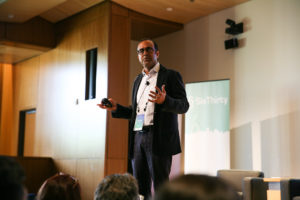
Presented by SixThirty
FinTech’s Data-Driven Evolution with Data Simply CEO Michelle Bonat

The FinTech sector is shifting more and more toward data-driven solutions.
The reliance on computer systems to augment the human element is an important change, as the idea is to arm individuals with more precise and reliable information.
The shift not only removes the element of human error but empowers financial guardians to be more effective than ever.
For an in-depth look at this change, we talked to Data Simply CEO and co-founder Michelle Bonat.
A lot of FinTech companies got their start when financial professionals encountered problems without viable solutions and endeavored to solve them. When do you realize there was a widespread need for this service?
Before moving to FinTech I was a banker. To do my job I had to wade through lots of documents about the companies I was analyzing, including an SEC database of 20 million filings.
A hard part is the volume and that much of the interesting parts are unstructured information (words) that can’t easily be read at scale. So humans miss important things. The other hard part is that the information needs to be understood from a financial perspective, where the meaning can be very different from outside finance.
For example, the word “liability.” Outside finance it means something negative. In finance, it is just one side of the balance sheet, neither good nor bad.
So we took the way financial analysts perceive and process unstructured financial information and built software that accomplishes this same thing – with financial models and computer algorithms that turn this data into signals – and can do it very quickly, at scale. It’s the solution I wish I had at the time.
We realized there was widespread demand when we demoed at an industry event and suddenly we had senior people from top financial institutions using our application. Subsequently, our growth and traction continued, with record growth month over month, without having spent any money on marketing.
It’s absolutely been organic growth which tells us we’re resonating with the market on an important problem.
Looking at the service Data Simply provides, is the goal to remove the element of human error for financial guardians or is it simply to arm them with more complete information for their decision making?
Think of Data Simply as a GPS for financial analysis. It guides you on what to focus on when tracking how a company (or it’s stock) is doing. It tells you what direction you should be heading in.
We do the same thing for company information. We analyze and track many different types of financial flags in unstructured data, such as company filings.
For example, we know that if a document is talking about bankruptcy, investigation, or product issues—that is a bad signal. If it is referring to expansion, stock split, product release—these are good things.
Talking about equity financing? We flag this as neutral since you should look at it but it could be good or bad from a financial standpoint.
Data Simply is redefining the way people reduce investment risk. Our Financial Intelligence Engine takes unstructured data, like words, and interprets them like a financial analyst would.
We use our engine to turn company SEC filings into signals so investment professionals know when something good or bad happens with companies they track, and even get it sent right to their phone. We process thousands of documents in our system every day, and work with top firms in the industry.
Following on that question, the goal of the data-driven solution industry appears to be not replacing the human element, but maximizing the impact of what that human element provides. Is that a fair characterization?
Great question. Yes, you are correct. There will always be a human element and we aren’t trying to replace that but to augment it.
We help investment professionals save time, reduce risk and make better investment decisions. Types of folks using our solution include financial advisors, asset managers, bankers and investor relations professionals.
Where in process of your growth did SixThirty come in, and how did their involvement impact the company?
We started with SixThirty fairly early in our lifecycle. They worked with us to understand how we might further our mission of helping people invest better, and to do this in a way that would support a large commercially successful technology company that leveraged our strengths: I’m a former banker with an MBA in finance.
I’m now a software engineer and ran Financial Web Applications for Oracle globally. My co-founder John, our CTO, is a tech wizard.
He was the first hire at TradeKing and as their architect brought them to be a Barron’s Top 5 investing site. The SixThirty process drove the B2B approach we have today.
Working with SixThirty was an important inflection point for our business and we’re very grateful for those insights. We continue to be in touch with them it’s a lifelong relationship.
What is on the horizon for Data Simply? What threshold would you like to see the company cross this year?
We’re excited to see our solution increasingly validated in the market. We continue to build our data intelligence platform for company information.
As we build our database you’ll start to see trends and patterns in the information that makes it even more valuable. Imagine being able to see information for a single company all in one place (for example, like Box), for an industry (for example, like Oil & Gas), or even a topic you care about (for example, like which companies made an accounting change, or moved to a new FDA phase).
Ultimately we would like to make it predictive.
Anything you would like to add?
The valuable information we find in company filings continues to surprise us, and how much of it is missed by others. The information is either hidden in plain sight, or filed after hours, or in very long documents. For example, we found information in an Aetna filing that moved the stock 4% in a single day.





